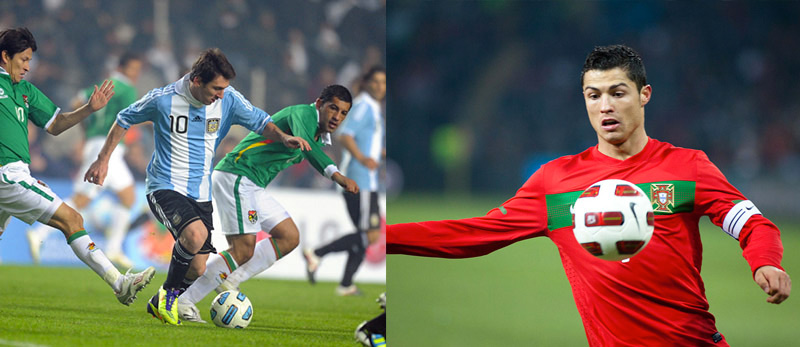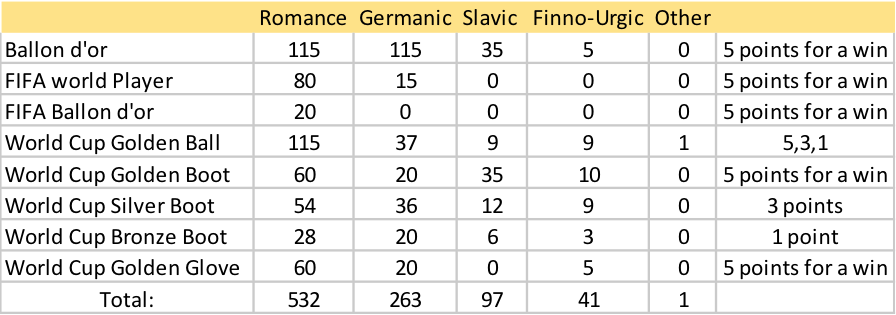With a big football jamboree on its way in Brazil, it’s time to start making predictions. Can Spain retain the trophy? Will Brazil withstand the enormous pressure and lift a record sixth cup? Can this Germany team finally produce on the biggest stage? Then there are the teams that you simply can’t discount, like France, Italy and the Netherlands.
A glance back through history suggests that the guy who holds up the big, gold trophy is much more likely to thank Dios than Gott because, according to incontrovertible* stats, speaking a Romance language makes you a better footballer.
Team stats
Eight nations have won football’s World Cup: two which speak a Germanic language (England and Germany) and six that speak romance languages (Argentina, Brazil, France, Italy, Uruguay and Spain). In terms of overall world cup wins, the romance teams are winning by fifteen to four. So that means that, historically, teams that speak a romance language have been more than three times as successful in the world cup as anyone else.
But is this proof of anything? Perhaps sharing a language with the host nation is a more important measure.
 A cabbage that looks a bit like the World Cup trophy
A cabbage that looks a bit like the World Cup trophy
Of nineteen World Cups since 1930, eight have been won by teams who share a mother tongue with the host nation. Not bad, but not exactly conclusive. Remove the world cups in the USA and Japan/Korea, where there was no serious possibility of a win by a team speaking the local language, and that means that just under half of World Cups have been won by a team that speaks the local language. Thirteen have been won by teams that share a language family with the host nation.
The stats may have looked a little different had the British teams not boycotted all tournaments before 1950, as a protest against “foreign” influence in a game that they considered to be fundamentally British (FIFA remains unloved in the UK). It was Brits who took football around the world, which is why you find teams with English names like AC Milan, formerly Milan Cricket and Foot-Ball Club, and River Plate, not to mention English vocabulary (corner is used in Spanish, not esquina).
Then again, when the Brits finally did turn up to the party they were rather underwhelming, with the USA beating England 1-0 during the 1950 World Cup. Some English newspapers reported the score as 10-1 to England, assuming there had been a miscommunication!
So nations that speak Romance languages have done disproportionately well in World Cups over the years, but what about the individual players?
Individual stats
If you had to name the greatest eleven of all time, it would almost certainly feature a mix of players from all over the world. Names like Maradona and Zidane would be joined by Cruyff and Beckenbauer to deliver a multilingual masterclass in football elegance.

What makes a footballer “great” is certainly a topic for discussion. For example, Zinedine Zidane is indisputably one of the finest players of the past twenty years, but could he have been such a star without someone like Patrick Viera or Claude Makélélé behind him to provide cover?
Yet the Makélélés and Vieras of this world will never win the big individual awards in football because they are simply not as sexy as the creative players in front of them.
The history of FIFA’s individual awards suggests that players whose come from a romance-language-speaking country are also most likely to be the star players, and the ones who perform on the biggest stage.

The sole representative in the “other” column is Hong Myung-Bo from South Korea, who won the Bronze Ball at the 2002 World Cup. All of the winners from Finno-Urgic-speaking nations come from Hungary!
Note the difference between the old Ballon d’or and the FIFA World Player awards. Before two prizes were merged into the FIFA Ballon d’or in 2010, the Ballon d’or was awarded by France Football magazine, whereas the FIFA award was voted by national team coaches and managers. Before 1995, the Ballon d’or could only be awarded to European players who were playing in Europe, so legends like Maradona and Pele could not win, possibly explaining the greater balance between language groups.
Once again, it seems that the key to being a great footballer is growing up in a country where the mother tongue came from Latin.
But those cool-headed Germanic types have got to be better at penalties, right?
The German Nationalmannschaft has the best record from the penalty spot, with a 100% success rate in four World Cup shootouts. However the team with the worst record (3 defeats in 3 shootouts) is… England.
Causality
Despite the numbers, it’s pretty unlikely that having a Romance language for a mother tongue actually makes you a better footballer. Growing up in a football culture is more likely to be a defining factor: Brazil is the country that is most represented in many of the lists and is also the country where a defeat more than half a century ago is still considered a national trauma.
If your language group was really the defining factor in what makes great footballers, multilingual countries like Switzerland and Belgium would surely be favourites to win in Brazil. Then again, Switzerland are among this year’s seeds and Belgium are many pundits’ favourite outsider, so maybe there’s something to this?
* These statistics may not actually be incontrovertible.
Image credits: Messi by LG?? via cc, Cristiano Ronaldo by Ludovic Péron via cc, Cabbage that looks like the World Cup trophy by Orangeaurochs via cc.


